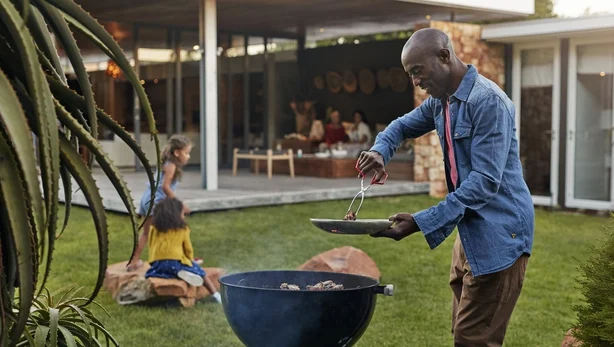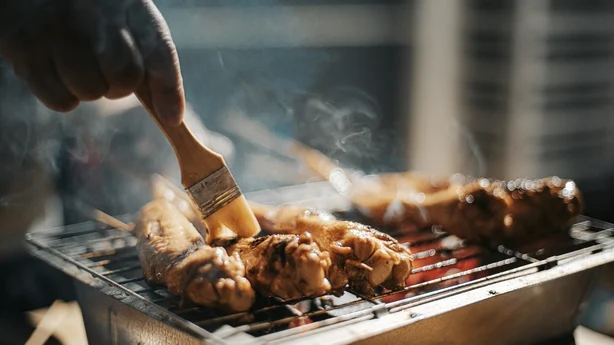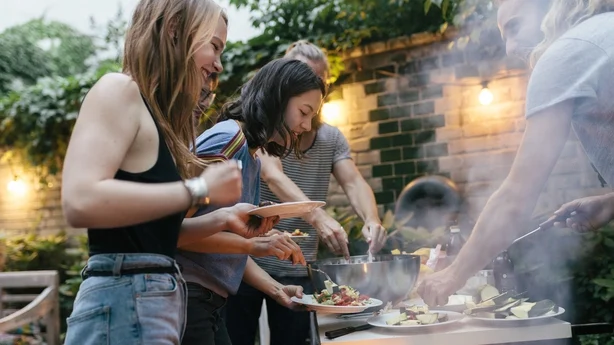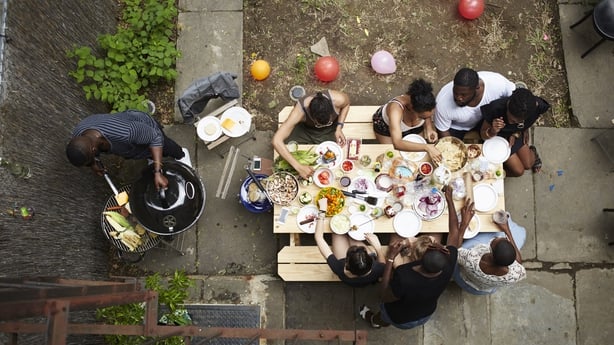The good weather we're enjoying might tempt you into the garden for a family dinner or even onto the beach for a bit of al fresco dining with friends, but are you hoping to expand your BBQ horizons beyond sad sausages and burnt burgers?

First things first: once you unearth your barbecue from wherever it's been hiding since the last bit of sunshine, you have to clean it thoroughly.
Brian recommends using a wire brush to scrub the wire rack with warm water and bread soda before rinsing it with hot water.
"Because bread soda is alkaline, it actually breaks down the grease much better than any detergent out there," he explains.
The next essential step, says Brian, is preparation. When it comes to cooking outdoors, the aim of the game is to keep food at a correct and safe temperature.
"Prepare the food in your kitchen. Keep it cold if it needs to be cold. Only bring it out at the last minute," he says, adding that hands should be washed thoroughly throughout, particularly while handling raw food.

When it comes to marinade, McDermott suggests brushing it on in light layers rather than pouring it as the oil-based sauces can ignite - as well as being dangerous, it will likely lead to an unappealing charred taste.
For chicken on the bone, try cutting a slit through the top of it, all the way down to the bone, to allow the marinade to soak in and for the chicken to cook thoroughly.
To ensure you're cooking to the correct temperature, a thermometer is always best, and at the very least ensure that juices are running clear.
If you're at all nervous about undercooking your chicken thighs or drumsticks, McDermott advises poaching them for about 35 minutes in water with a bay leaf and some black pepper before finishing it off on the BBQ.
"Just remember poaching is not boiling," he adds. "Boiling is the rolling of water, poaching is like a glass of lemonade or sparkle - light bubbles - for 35 minutes. Let it sit there in the morning time, dry it off, then brush on your marinade; it will keep it tender, juicy, and it will make sure there is beautiful flavour and proper cooking."

To avoid food waste, make a plan before you hit the shops and aim for two types of meat, a couple of salads, and a side of potatoes.
Brian encourages listeners to shop in season and ditch the traditional burgers and sausages for a half-leg or full-leg of Irish lamb.
He suggests butterflying the leg of lamb (or asking your butcher to do so) and marinating it in Irish rapeseed oil, rosemary, garlic, sea salt, black pepper, mint leaves, and a zest of lemon.
"Mix that up in a bowl, brush it to the inside of your lamb, and if you start cooking the lamb and keep with it, turning it, re-marinating it, it's the most succulent, gorgeous thing."
Serve the lamb with some coleslaw and mint yogurt in a pitta pocket and your guests, Brian says, will be only delighted.

safefood's 7 top tips for a safe barbeque
- Keep perishable foods like salads, coleslaw and quiche in your fridge until you are ready to serve them.
- Burgers, sausages and kebabs, pork and poultry must be cooked all the way through – take your food off the heat, pop the thermometer in the thickest part of the meat and when it reaches 75 degrees Celsius, then it's cooked and ready to eat. Steaks can be served 'rare' as harmful bacteria are on the outside only (and not in the centre).
- If you like to marinate your meat, make sure any marinade used on raw meat is not then used as a sauce to coat vegetables or cooked meat as it will contain raw meat bacteria.
- If you choose to barbeque any frozen food, it must be firstly completely thawed on the bottom shelf of your fridge before you cook it.
- When handling raw meat and poultry, wash your hands thoroughly and frequently, most importantly before going on to prepare salads and other ready to eat foods.
- Once your meat is cooked thoroughly, make sure to keep cooked meat separate from raw meat and to use separate chopping boards, cooking utensils and plates. Harmful bacteria in raw meat, poultry and their juices can cross contaminate cooked food and lead to food poisoning, something your family won’t thank you for.
- If there are leftovers from your barbeque, allow the food to cool before refrigerating, however, make sure to refrigerate food within two hours of cooking. Always remember with leftovers - if in doubt, throw it out.
For more recipes and grill-master tips, listen back to Brian's chat with Claire above.
Disclaimer: The copyright of this article belongs to the original author. Reposting this article is solely for the purpose of information dissemination and does not constitute any investment advice. If there is any infringement, please contact us immediately. We will make corrections or deletions as necessary. Thank you.






